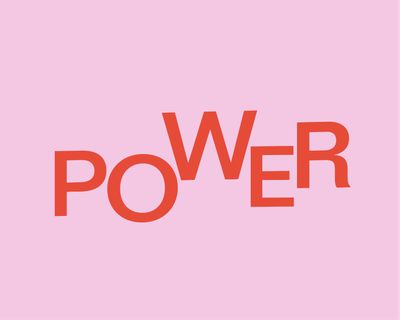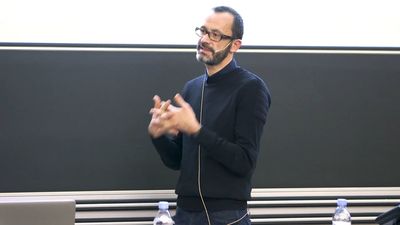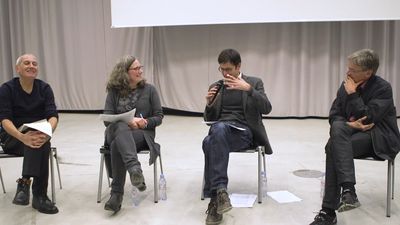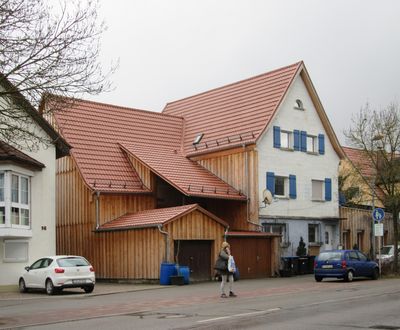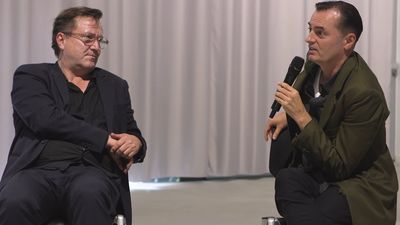Transmaterial PoliticsAndrés Jaque in conversation with Andreas Ruby
The sequence started the moment that one of the young boys living in the family farm in Touba decided to emigrate to Madrid. At this point, the family matriarch at the farmhouse in Touba called one of the males living in Madrid, an older cousin of the boy. The cousin did not answer his cell phone but, instead, headed to a phone parlor where he could obtain better rates for international calls. There, he called the family matriarch to learn of the next arrival. He asked her to stress the need for the boy to walk all the way to either an African grocery store or a Senegalese restaurant in the Lavapiés district. The plan succeeded and, several months later, the young boy made his way to the African grocery in Lavapiés where he found people who put him in touch with his relative. He then took a place in a shared apartment with his cousin and four other Mouride men. It is important to consider the nature of the urban composition in which this event developed: not a city but a fragmented transnational assemblage. In this urban constellation, built devices—such as the apartments, mosque, phone parlors, African grocery stores, and Senegalese restaurants in Lavapiés—are activated in the urban scene only by interacting with a number of diverse technologies including cell phones, rugs, speakers, online platforms, and money transfer services. This urbanism is not shaped by the city itself—neither by its grid nor by the volumes and spaces its buildings create—but by an association of diverse devices that interact to produce an interscalar ecosystem of heterogeneous entities. Fragments of this constellation can be found in shared spaces collectively constructed in the minds and books of the Mouride believers. These fragments are connected by interaction and the performativity of urban dynamics. They gain continuity when phone calls are made, money transfers are ordered, and the relatives of recent immigrants are informed of arrivals. The urbanism by which the Mouride family is enacted is not fixed but performative. Such an urbanism challenges the ways we think politics is embodied in architecture.
In recent years, this issue has compelled a number of theorists and practitioners to align themselves with one of two positions: techno-determinism or techno-neutrality. The determinists argue that the form of the city and its architectural conditions cause societies to emerge in the ways they do. The neutralists, however, believe that architecture is a neutral actor that can potentially contain any social form. Whereas quantification has been the argument to insistently claim the disconnection of architecture from politics, and even to be the first step towards post-political architectural practices, in the account of the specific cases, quantification does not generate space of convergence and does not provide social coherence. Calculation-made enactments are hosted by different and evolving social demarcations, performed in desynchronized time sequences, and cater to diverse and, in many cases, confronted interests, ideologies, sensitivities, stakes, and programs. Parametric calculation, in these cases, is not providing consensus, nor a post-political society, but rather an urbanism of diverse mathematics.
Andrés Jaque is the founder of the Office for Political Innovation, an international practice that explores material politics in the intersection of design, research and activism. He is the youngest recipient of the Frederick Kiesler Prize for the Architecture and the Arts, and he has been awarded with the Silver Lion at the14th Venice Biennale and the Dionisio Hernández Gil Prize. He is Professor of Advanced Architectural Design at Columbia University GSAPP and Visiting Professor at Princeton University SoA.
Andreas Ruby is an architectural critic and theorist. From 1999 to 2001 he was editor of the architectural journal Daidalos. He has taught architectural theory and design at the University of Kassel, Cornell University, and the Ecole Polytechnique Féderale in Lausanne. Together with Ilka Ruby he founded the agency Textbild and the publishing house Ruby Press. Since 2016 he is director of the Swiss Architecture Museum.
